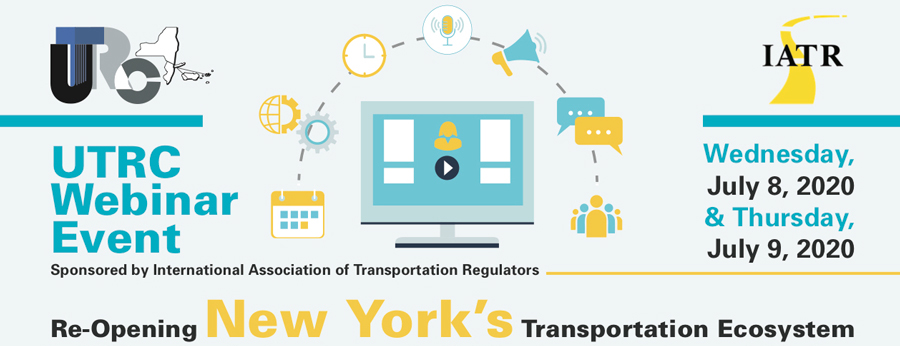The University Transportation Research Center (UTRC) at The City College of New York has been analyzing how the COVID-19 pandemic has already changed every aspect of mobility. In a new webinar series produced by UTRC and sponsored by the International Association of Transportation Regulators (IATR), speakers from the leading transportation trade groups discussed the unique and unprecedented challenges posed by the pandemic, and what they expect as they navigate reopening and ensuring a safe future for all riders. Held July 9 and moderated by UTRC Transportation Technology Chair Matt Daus of Windels Marx, The Reinvention of the Taxicab & For-Hire Vehicles Industries featured panelists Ira Goldstein of the Black Car Fund (BCF), Brendan Sexton of the Independent Driver Guild (IDG), Cira Angeles of Livery Base Owners, Michael Woloz of the Metropolitan Taxi Board of Trade (MTBOB), Avik Kabessa of the Livery Round Table, and Eric Rothman of the Drivers’ Opportunity Service Association (DOSA).

NYC was a major epicenter of the outbreak and had to pivot quickly, which forced city officials and trade group leaders to solve problems they never faced before. Transformed overnight from the city that never sleeps to the city that is sheltering in place—shuttering the region’s ubiquitous subway system at one point and rendering the normally bustling Times Square a ghost town—the trade groups estimate that ridership was down 85-90 percent across all sectors. With all of those vehicles out of service, it created new situations: where to park them so insurance could be reduced. The organizations leaped into action to help drivers and bases tap into federal assistance or unemployment, get access to medical professionals, and even offer legal advice free of charge.
Beyond those challenges, drivers were a lifeline for many essential services, including delivering food, medical supplies, and packages during the shutdown. For those who did continue to work, it became critical to protect them and their potential passengers. Handwashing is crucial to preventing the spread, but drivers don’t have easy access to bathrooms or running water over the road. Goldstein reports that in conjunction with the IDG, BCF was able to assemble and distribute more than 20,000 kits containing masks, hand sanitizer, and gloves to drivers and bases. He says that it was one of the most-appreciated programs in all his years at the Fund.
Modes of transportation had been shifting long before the pandemic as the region learned to strike the right balance between established transportation providers and the aggressive impact of TNCs. Before COVID presented its own mental wellness issues, an uptick in medallion driver suicides starting two years ago rocked the taxi community. Both BCF and IDG had established a wellness program that continued to offer drivers a chance—virtually and over the phone—to seek assistance and form a bond with others who were also struggling.
As the city awaits further guidance from Mayor Bill de Blasio, the trade groups continue to advocate for those they represent.
The webinar is available on demand, which can be accessed here.
[07.14.20]

